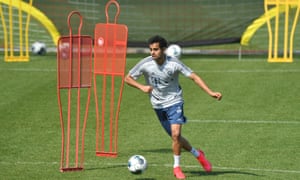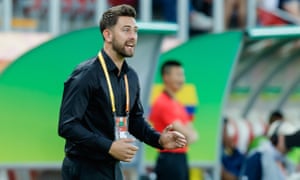[ad_1]
There is a word that Des Buckingham, during almost six years working in New Zealand, has used as a mantra to live by. In the Maori language, Mana represents a spiritual essence that almost defies translation but in everyday use it broadly applies thus: a way of holding oneself through dignity, respect, humanity and authority.
It has been invaluable over the past five days because Buckingham is navigating one of the biggest disappointments of a young coaching career that, since he moved to the other side of the world after leaving Oxford United in 2014, had rarely let up. When his New Zealand Under-23 side qualified for the Olympics last October he expected to be leading them to Tokyo 2020 nine months later. The Covid-19 crisis put that on hold and then the dream was snatched away completely: last Thursday NZ Football confirmed it would not extend his contract beyond August – effectively making him redundant now – and that a restructuring would see the senior coach, Danny Hay, take the team to Tokyo next year.
“You just have to reflect on a really enjoyable and successful time with some really memorable and historic moments,” Buckingham says. “The decision’s not going to change. My staff and I have never been ones to shout from the rooftops, whether things are going well or not.”
The hurt is still raw but he has only good words to offer about his former employers, even though plenty in his orbit have expressed their views strongly. Speculation over his future had rumbled to the extent that, last month, a group of 24 players wrote to NZ Football requesting that Buckingham and his Whanau – “family” – be kept together. It was not heeded and last week’s news is understood to have gone down particularly poorly among a group whose fortunes he had turned around.
That comes as little surprise upon examining Buckingham’s record. He first came to global attention when New Zealand performed superbly at last year’s Under-20 World Cup in Poland, edged out on penalties by Colombia in the last 16 but outdoing any of the country’s previous showings at a Fifa event. They did it in style, bucking the image of Kiwi footballers as honest-but-dull grafters with a slick, often scintillating, attacking approach.
“Before the tournament we were a team that, across the last decade, was always outpassed, outshot and outscored,” he says. “We’d won two games in 10 years. So we wanted to agree on a way of playing and showcase exactly what New Zealand players could do on the world stage. I said to them: ‘Let’s go there with belief and play the way we think we can, even if we lose all three games.’”
Buckingham put together a document that looked to fuse his playing philosophy with other attributes –“a never-say-die attitude, a real humbleness, no egos, a really open people who are receptive to new ideas and putting others first” – he perceived in a New Zealand player. His side lost once in open play during the tournament, Uruguay winning what was essentially a dead rubber. Honduras were beaten 5-0 and a Norway team featuring Erling Braut Haaland were quietened in a 2-0 win.

The Bayern Munich midfielder Sarpreet Singh was influential and so was Liberato Cacace, a 19-year-old left-back with explosive attacking potential tipped for a move to Europe. The shootout against Colombia was, in Buckingham’s words, “devastating” because they felt so close to a push for the latter stages. But the point had been made: Kiwi footballers could get it down and play with the best.
“We absolutely flipped it on its head,” he says. “The playing style was totally different. We were outpassing teams, outshooting them, and reduced opportunities on our goal by a third. Some of the football we played was a pleasure to watch.”
He had been combining the Under-20s role with the seniors’ assistant manager position but was then tasked with overseeing the Olympic qualification, which was earned via New Zealand’s first football gold medal at a Pacific Games. In a less troubled world that would have been the springboard to his proudest moment yet, but joy can still be found in a journey he had never foreseen.
“It was a bit of a jump, but if I hadn’t taken it I’d have always looked back and wondered,” he says of the 12,000-mile journey from Oxford to Wellington. “I can’t describe why, but it felt right.” He had been with his local club for a decade, starting as an academy coach after his ambitions as a goalkeeper in the youth team fizzled out and becoming part of Chris Wilder’s first-team staff at the age of 29. Wilder and the long-serving Mickey Lewis were towering influences; much earlier Brendan Rodgers had been one too, during a spell playing for Reading’s youth setup.

So a move to Wellington Phoenix, the only New Zealand club to play in the Australian A-League, took him far from any comfort zone. “My last game at Oxford was a 12,000 sell-out at the Kassam and Dave Kitson had just risen to score the winner,” he says. “I arrived in New Zealand and the first game I went to watch was played to a capacity of 450. Getting on a plane for a few hours to every away game took some adjustment too. But it didn’t take long, and the football was of a good standard.”
Buckingham was recruited as Phoenix’s assistant but ended up becoming the youngest head coach in A-League history, taking over for six months in early 2017 and steering them away from the bottom of the table. A brief return to England ensued with Stoke’s Under-23s – he worked under Mark Hughes and Paul Lambert – but then NZ Football came calling with the Under-20 position.
“I don’t know how many experiences you get like that in a lifetime,” he reflects. Once the frustration and, perhaps more pertinently, the country’s lockdown have eased he will look to supplement them, although it will be a wrench to leave. In theory he could take off all by himself: Buckingham received a trial flight with an instructor for his 30th birthday, five years ago, and one thing led to another. Six theory exams and innumerable hours later he emerged with a full pilot’s licence for craft of 24 seats or below; his father visited recently and turned a shade or two of green as Buckingham flew him over the breathtaking Marlborough Sounds coastline.
As daredevil hobbies go it takes some beating but he hopes a new challenge in football will be consuming him soon. Another motto from his adopted home helps him make sense of what has passed.
“There’s an All Blacks saying about leaving things in a better place than when you found them,” he says. “I’d like to think that, from when we picked it up until now, it’s in a far better place in terms of results, performances and culture across both teams. I hope they continue to go on and do what I think they can, achieving some more special things for the country.”
[ad_2]
Source link
